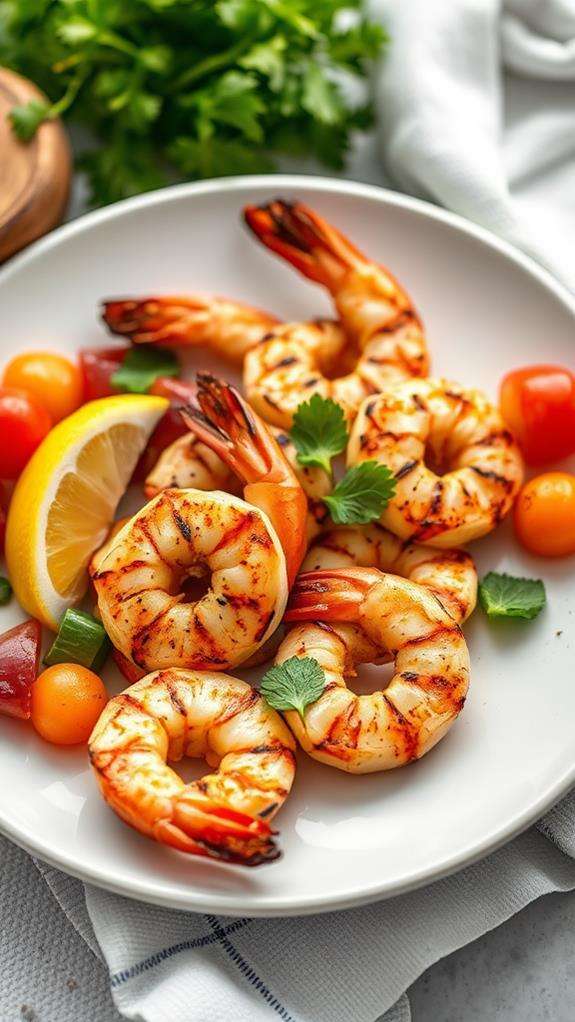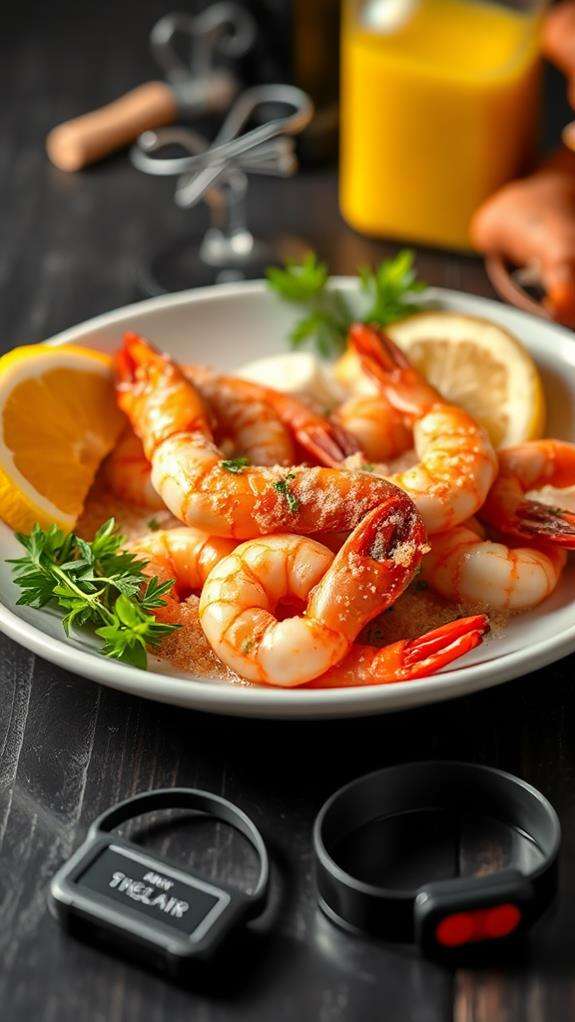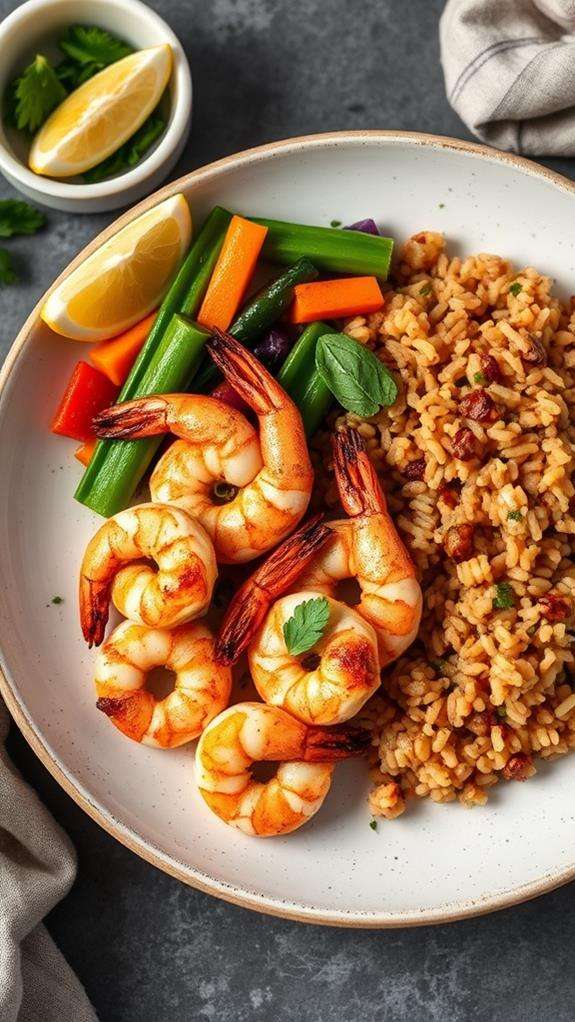Is It Safe to Eat Shrimp Everyday
While shrimp is a nutrient-dense seafood, it's not recommended to eat it daily. Shrimp offers high-quality protein, omega-3 fatty acids, and essential minerals like selenium and iodine. However, it's high in cholesterol and may contain trace amounts of mercury. Moderation is key—aim for 2-3 servings per week. Be mindful of potential allergies, as shellfish allergies are common and can be severe. When consuming shrimp, choose sustainable sources and vary your preparation methods. Balancing shrimp with other lean proteins and incorporating a diverse range of foods in your diet is essential for ideal health. Exploring the nuances of shrimp consumption can help you make informed dietary choices.
This post may contain affiliate links. If you make a purchase through these links, I may earn a commission at no additional cost to you. Additionally, portions of this post may be generated using artificial intelligence (AI) technology. While we strive for accuracy, please be aware that AI-generated content may not always be perfect and should be fact-checked when necessary.
The Spatula Scoops
- Eating shrimp daily may lead to excessive cholesterol intake, as a 3-ounce serving contains 166 mg of cholesterol.
- Moderation is key; limiting shrimp consumption to 2-3 times per week is generally recommended.
- Daily shrimp consumption could increase the risk of developing a shellfish allergy or worsening an existing sensitivity.
- While shrimp is low in mercury, daily intake may still lead to cumulative mercury exposure over time.
- Eating shrimp every day may limit dietary variety, potentially causing nutrient imbalances or deficiencies in other important foods.
Nutritional Profile of Shrimp

With its impressive nutritional profile, shrimp stands out as a low-calorie, protein-rich seafood option. You'll find that a 3-ounce serving of shrimp contains about 20 grams of protein and only 84 calories. This makes it an excellent choice for those watching their weight or looking to build muscle. When purchasing shrimp, it's vital to deliberate on proper storage techniques to maintain its quality. Freezer-safe packaging can help prevent freezer burn and preserve the shrimp's nutritional value for up to 6-12 months.
Shrimp is also a good source of essential nutrients. It's rich in selenium, an antioxidant that supports your immune system and thyroid function. You'll also get a healthy dose of vitamin B12, pivotal for nerve function and red blood cell formation. Additionally, shrimp provides omega-3 fatty acids, which are advantageous for heart health.
However, it's imperative to recognize that shrimp is relatively high in cholesterol. A single serving contains about 166 milligrams, which is more than half the recommended daily intake. While dietary cholesterol doesn't affect blood cholesterol levels as much as once thought, those with certain health conditions may need to limit their intake. Shrimp also contains iodine, zinc, and copper, contributing to its nutritional value. When incorporating shrimp into your diet, deliberate on these factors to make informed decisions about your seafood consumption.
Health Benefits of Shrimp
When you consider adding shrimp to your daily diet, you'll find they offer numerous health benefits. Like salmon, shrimp are rich in omega-3 fatty acids, which greatly reduce heart disease risk and help lower blood pressure. They're packed with essential nutrients like protein, selenium, and vitamin B12, while being surprisingly low in calories, making them an excellent choice for weight management. Additionally, shrimp contain heart-healthy omega-3 fatty acids, which can help reduce inflammation and support cardiovascular health.
Rich in Nutrients
Seafood lovers rejoice! Shrimp isn't just delicious; it's also a nutrient powerhouse. When you're looking to boost your diet with essential nutrients, shrimp is an excellent choice. These little crustaceans are packed with high-quality protein, providing all nine essential amino acids your body needs but can't produce on its own.
You'll find that shrimp is low in calories but rich in vitamins and minerals. It's an exceptional source of selenium, an important antioxidant that supports your immune system and thyroid function. Shrimp also contains significant amounts of vitamin B12, indispensable for maintaining healthy nerve cells and red blood cells. You'll get a good dose of iodine, essential for proper thyroid function, and omega-3 fatty acids, which are beneficial for heart and brain health.
Moreover, shrimp provides zinc, iron, and phosphorus, all of which play imperative roles in your body's functions. The astaxanthin in shrimp, a powerful antioxidant, may help reduce inflammation and lower your risk of several chronic diseases. By incorporating shrimp into your diet, you're not just satisfying your taste buds; you're nourishing your body with a wide array of essential nutrients.
Low in Calories
Counting calories? You'll be pleased to know that shrimp is a low-calorie seafood option that can fit nicely into your diet plan. A 3-ounce serving of cooked shrimp contains only about 84 calories, making it an excellent choice for those watching their caloric intake.
Shrimp's low-calorie profile is accompanied by several other nutritional benefits:
- High protein content
- Low in saturated fat
- Rich in omega-3 fatty acids
- Good source of vitamins and minerals
- Contains antioxidants like astaxanthin
These attributes make shrimp a nutrient-dense food, meaning you're getting a greatly substantial amount of nutritional value for relatively few calories. This can be particularly beneficial if you're trying to lose weight or maintain a healthy weight while still ensuring your body gets the nutrients it needs.
When incorporating shrimp into your diet, be mindful of preparation methods. Boiling, grilling, or steaming are healthier options compared to frying, which can markedly increase the calorie content. Also, watch out for high-calorie sauces or butter that might be served with shrimp dishes. By choosing low-calorie cooking methods and accompaniments, you can maximize the benefits of shrimp's naturally low-calorie profile in your daily meals.
Heart-Healthy Omega-3s
One of the most significant health benefits of shrimp is its high content of omega-3 fatty acids, particularly EPA and DHA. These essential fats play a pivotal role in maintaining your heart health, reducing inflammation, and supporting brain function. When you consume shrimp regularly, you're providing your body with these valuable nutrients.
| Type of Omega-3 | Amount per 100g | Benefits |
|---|---|---|
| EPA | 171 mg | Anti-inflammatory |
| DHA | 144 mg | Brain health |
| Total Omega-3 | 315 mg | Heart health |
While shrimp isn't as high in omega-3s as fatty fish like salmon, it's still a commendable source. You'll need to eat about 12 ounces of shrimp to get the recommended weekly intake of omega-3s. Additionally, it merits mentioning that the omega-3 content can vary depending on the shrimp's diet and environment. Wild-caught shrimp typically have higher levels of these beneficial fats compared to farm-raised varieties. By incorporating shrimp into your diet, you're taking a step towards better heart health and overall well-being.
Cholesterol Concerns

While shrimp offers numerous health benefits, it's important to ponder its high cholesterol content. You may have heard that shrimp contains a significant amount of dietary cholesterol, but it's indispensable to comprehend that dietary cholesterol doesn't necessarily translate directly to increased blood cholesterol levels. Much like chocolate's expiration date, the impact of shrimp on your health depends on various factors and should be evaluated holistically. The key to incorporating shrimp into your diet safely lies in moderation and balance, ensuring you're not overconsuming this shellfish at the expense of other nutritious foods.
Shrimp's High Cholesterol Content
Shrimp's notorious reputation for high cholesterol content often raises concerns among health-conscious consumers. While it's true that shrimp contains more cholesterol than many other seafood options, it's crucial to understand the nuances of dietary cholesterol and its impact on your health.
Shrimp contains approximately 166 mg of cholesterol per 3-ounce serving. Dietary cholesterol doesn't necessarily translate to increased blood cholesterol. Shrimp is low in saturated fat, which has a greater impact on blood cholesterol levels. The omega-3 fatty acids in shrimp may help improve heart health. Moderation is key when incorporating shrimp into your diet.
Despite its high cholesterol content, shrimp can still be part of a healthy diet. The American Heart Association recommends limiting dietary cholesterol to 300 mg per day for most people. If you're concerned about your cholesterol levels, it's advisable to consult with a healthcare professional or registered dietitian. They can help you determine how much shrimp you can safely include in your diet based on your individual health needs and risk factors.
Dietary Cholesterol vs. Blood
Understanding the difference between dietary cholesterol and blood cholesterol is key to grasping shrimp's impact on your health. Dietary cholesterol is the cholesterol you consume through food, while blood cholesterol is produced by your liver and circulates in your bloodstream. Contrary to popular belief, the cholesterol you eat doesn't directly translate to increased blood cholesterol levels for most people.
Your body regulates cholesterol production based on your dietary intake. When you consume more cholesterol, your liver often compensates by producing less. This homeostatic mechanism helps maintain balance. However, some individuals are "hyper-responders" and may experience a more substantial increase in blood cholesterol from dietary sources.
For the majority, moderate shrimp consumption isn't likely to markedly impact blood cholesterol levels. Studies have shown that shrimp's high omega-3 content and low saturated fat levels may even have a positive effect on your lipid profile. It's important to consider your overall diet and lifestyle when examining cholesterol concerns. If you're worried about your cholesterol levels, consult a healthcare professional for personalized advice. They can help you interpret your lipid panel and determine if dietary changes are necessary.
Moderation and Balance Key
Despite the nuances of cholesterol's impact, moderation remains the cornerstone of a healthy diet. While shrimp can be a nutritious addition to your meals, eating it daily may not be the best approach. Balance is key when considering your overall dietary intake. You'll want to incorporate a variety of protein sources and other food groups to guarantee you're getting a wide range of nutrients.
When it comes to shrimp consumption, consider the following:
- Portion size: Stick to recommended serving sizes
- Frequency: Limit shrimp to 2-3 times per week
- Preparation method: Choose grilling or baking over frying
- Accompaniments: Pair with vegetables and whole grains
- Alternatives: Rotate with other lean proteins like fish or poultry
Mercury Content in Shrimp
Mercury levels in shrimp are a key consideration when evaluating their safety for daily consumption. While shrimp generally contain lower mercury levels compared to larger fish, it's still important to be aware of their mercury content. The FDA classifies shrimp as a "low mercury" seafood option, making them a relatively safe choice for regular consumption.
Here's a comparison of mercury levels in various seafood:
| Seafood Type | Mercury Level (ppm) | FDA Category |
|---|---|---|
| Shrimp | 0.009 | Low |
| Salmon | 0.022 | Low |
| Cod | 0.111 | Low |
| Tuna (canned) | 0.128 | Medium |
| Swordfish | 0.995 | High |
As you can see, shrimp have one of the most favorable mercury concentrations among popular seafood options. However, it's still wise to practice moderation. The FDA recommends consuming a variety of seafood to minimize potential risks associated with any single type. If you're pregnant, nursing, or have certain health conditions, you should consult your healthcare provider about your seafood intake, including shrimp consumption. Remember, while shrimp are generally safe, a balanced diet is key to ideal health.
Allergies and Sensitivities

Considering allergies and sensitivities is essential when deciding whether to eat shrimp daily. Shellfish allergies are one of the most common food allergies, and they can be severe. If you're allergic to shrimp, even small amounts can trigger reactions ranging from mild to life-threatening. It's vital to be aware of your body's response to shrimp and consult an allergist if you suspect a sensitivity.
Some key points to examine about shrimp allergies and sensitivities:
- Symptoms can include hives, swelling, difficulty breathing, and anaphylaxis
- Cross-reactivity with other shellfish is common
- Allergies can develop at any age, even if you've eaten shrimp before
- Some people may have a seafood intolerance rather than a true allergy
- Hidden shrimp ingredients in processed foods can pose risks
If you're not allergic but have a mild sensitivity, you might experience digestive issues or headaches after eating shrimp. Pay attention to your body's signals and adjust your consumption accordingly. Remember, moderation is key, even if you don't have allergies. If you're uncertain about your reaction to shrimp, it's best to consult a healthcare professional before making it a daily part of your diet.
Sustainable Shrimp Sourcing
When it comes to eating shrimp daily, have you considered the environmental impact of your consumption? Sustainable shrimp sourcing is a vital factor to weigh in your decision. Many shrimp farms use practices that harm ecosystems, deplete wild fish populations, and contribute to water pollution.
To guarantee you're making an eco-friendly choice, look for shrimp certified by organizations like the Aquaculture Stewardship Council (ASC) or Marine Stewardship Council (MSC). These certifications indicate that the shrimp have been farmed or caught using responsible methods. You'll often find this information on product packaging or by asking your seafood supplier.
Wild-caught shrimp can be a sustainable option if harvested using methods that minimize bycatch, such as turtle excluder devices (TEDs). However, some wild shrimp fisheries face overexploitation. Farm-raised shrimp, when produced using best practices, can be a more sustainable choice. Look for farms that use closed containment systems, which reduce pollution and disease spread. Additionally, consider opting for locally sourced shrimp to reduce the carbon footprint associated with transportation. By making informed choices, you can enjoy shrimp while supporting sustainable practices.
Recommended Serving Sizes

To maintain a healthy diet while enjoying shrimp, it's crucial to understand recommended serving sizes. The U.S. Department of Agriculture suggests consuming 8 ounces of seafood per week, which includes shrimp. For a single serving, aim for about 3 to 4 ounces, roughly equivalent to 85-113 grams.
When considering portion sizes, keep these points in mind:
- One ounce of shrimp is approximately 4 large or 5-6 medium shrimp
- A 3-ounce serving is about the size of a deck of cards
- Cooked shrimp shrinks, so account for this when measuring raw
- Restaurant portions often exceed recommended serving sizes
- Adjust servings based on your overall caloric needs and diet plan
Preparation Methods
Properly prepared, shrimp can be a delicious and nutritious addition to your diet. The key lies in using safe cooking methods that preserve flavor while eliminating potential health risks. You'll want to focus on techniques that thoroughly cook the shrimp without overdoing it.
| Method | Cooking Time | Temperature | Best For |
|---|---|---|---|
| Boiling | 2-3 minutes | 212°F | Salads, cocktails |
| Grilling | 2-3 minutes | 350-450°F | BBQs, skewers |
| Sautéing | 3-4 minutes | Medium-high | Stir-fries, pasta |
| Baking | 7-8 minutes | 400°F | Casseroles |
When preparing shrimp, always confirm they're fully thawed and deveined. Cook them until they turn pink and opaque, with the tails curled. Don't overcook, as this can make them rubbery. For food safety, use a meat thermometer to check that the internal temperature reaches 145°F. Remember, proper handling is pivotal. Always wash your hands and utensils after handling raw shrimp to prevent cross-contamination. By following these guidelines, you'll maximize both safety and flavor in your shrimp dishes.
Balancing Shrimp in Your Diet

With proper preparation methods in mind, let's consider how to incorporate shrimp into a balanced diet. While shrimp can be a nutritious part of your meals, it's important to maintain variety in your protein sources. Aim to include shrimp as part of a diverse diet that includes other seafood, lean meats, plant-based proteins, and vegetarian options.
To balance shrimp in your diet effectively, consider these tips:
- Alternate shrimp with other protein sources throughout the week
- Pair shrimp with whole grains and vegetables for complete meals
- Monitor portion sizes, aiming for 3-4 ounces per serving
- Choose wild-caught shrimp when possible for better nutritional value
- Vary cooking methods to avoid monotony and maximize nutrient retention
Frequently Asked Questions
Can Pregnant Women Safely Eat Shrimp Every Day?
While shrimp can be part of a healthy pregnancy diet, it's not recommended to eat them every day. You should limit your seafood intake to 8-12 ounces per week due to potential mercury contamination. Shrimp are generally low in mercury, but variety is key for a balanced diet. Guarantee your shrimp are fully cooked to avoid foodborne illnesses. Consult your healthcare provider for personalized advice, as they can consider your specific health needs and any potential risks.
How Long Can Cooked Shrimp Be Stored in the Refrigerator?
You'd swear cooked shrimp could last forever, but that's not the case. In reality, you can safely store cooked shrimp in your refrigerator for up to 3-4 days. It's vital to refrigerate them within two hours of cooking. To maximize freshness, store your shrimp in an airtight container or wrap them tightly in aluminum foil or plastic wrap. Remember, if you notice any off-odors or discoloration, it's best to discard the shrimp to avoid potential foodborne illness.
Are There Any Drug Interactions to Consider When Eating Shrimp Regularly?
You should be aware of potential drug interactions when eating shrimp regularly. While shrimp generally doesn't interact with medications, it contains high levels of iodine. If you're taking thyroid medications, consult your doctor as iodine can affect their effectiveness. Additionally, if you're on blood thinners, shrimp's omega-3 fatty acids might enhance their effects. For those with gout, shrimp's purines could trigger flare-ups. Always discuss your diet with your healthcare provider, especially if you're on any long-term medications.
Does Eating Shrimp Daily Affect Skin Health or Appearance?
Picture your skin as a delicate canvas, with shrimp as potential brushstrokes. Eating shrimp daily can affect your skin's health and appearance. You'll benefit from its omega-3 fatty acids, which may reduce inflammation and promote a healthy glow. However, shrimp's high cholesterol content could potentially contribute to skin issues if consumed excessively. Additionally, if you're prone to shellfish allergies, daily consumption might trigger skin reactions. It's best to maintain a balanced diet and consult a healthcare professional for personalized advice.
Can Daily Shrimp Consumption Impact Weight Loss or Weight Gain Efforts?
Shrimp can impact your weight loss or gain efforts, depending on how you consume them. They're low in calories and high in protein, which can support weight loss by keeping you full. However, if you're eating shrimp fried or with high-calorie sauces, you might gain weight. The preparation method matters. For weight loss, opt for grilled or steamed shrimp. For weight gain, add shrimp to calorie-dense meals. Remember, overall calorie balance is key in any weight management plan.
Conclusion
While shrimp can be a nutritious addition to your diet, eating it every day isn't recommended. Like a double-edged sword, shrimp's benefits come with potential risks. You'll need to balance its protein and nutrients against concerns like cholesterol, mercury, and allergies. Consider sustainable sourcing and proper preparation methods. Ultimately, moderation is key. Aim for 2-3 servings of seafood per week, including shrimp, as part of a varied diet to maximize benefits while minimizing risks.





